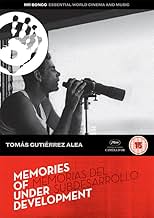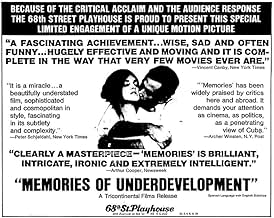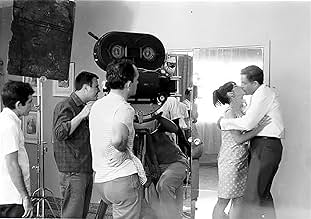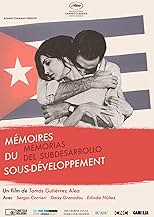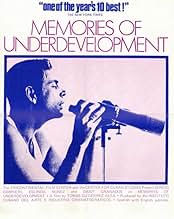Añade un argumento en tu idiomaA Cuban man cycles through his opinions and memories as the threat of foreign invasion intensifies and the rest of his family moves to Miami.A Cuban man cycles through his opinions and memories as the threat of foreign invasion intensifies and the rest of his family moves to Miami.A Cuban man cycles through his opinions and memories as the threat of foreign invasion intensifies and the rest of his family moves to Miami.
- Dirección
- Guión
- Reparto principal
- Premios
- 2 premios y 2 nominaciones en total
Reseñas destacadas
Alea elaborates this predictable story in which, from the beginning, the idea is built that something does not fully agree with what Sergio think will happen. The narration submerges you in the timeline and slowly seams things together in a brilliant and subtle way. I have always enjoyed this film minute by minute, the upheavals and the disappoints that happens to break the character mentally. The film is shot in semi-documentary style which is one of the highlights as it pushes the narrative with no room for spoon-fed character development. Even with limited emphasis on traditional storytelling the film carries emotional impact with solid acting effort throughout the runtime. Some may look at it from the view of art-house documentary with newsreel footage of the Cuban Revolution dressed up as a political drama, but it is more than that. Also, I will recommend Stefan Uher's The Sun in a Net (1963), Halina Bielinska's Sam posród miasta (1965), Paulo César Saraceni The Dare (1966), The Vampires of Poverty (1977), The Man Who Sleeps (1974) and Ice (1970). If you haven't seen it, I would suggest you do add it in your watch list.
To conclude Memorias del subdesarrollo (1968) is simply a brilliant character analysis, also a cleverly constructed political drama realised in a time where the facts truly are in your face.
Sergio (Sergio Corrieri) is a frustrated writer who chooses to remain in Cuba rather than follow his family to Miami just "to see how it all turns out". Though he has strong feelings for his people, he is indifferent towards politics an observer rather than a participant. Alea shows the artist as anti-hero, a man who undergoes an identity crisis, is sapped of all his vitality, feels old in his thirties, and drifts along without meaning and purpose. Unable to write the novel he wants, Sergio survives on rental income from apartments and lives in middle class luxury while around him housing is deteriorating and there are serious gas and oil shortages. He spends his days smoking in bed, looking out of a telescope through his bedroom window, taking walks, watching television, and meeting young women. He makes no pretense of his being an outsider but complains that "everything happens to me too early or too late". Hanna, the woman he says he truly loved urged him to move to New York with her and become a writer but he chose to remain in Cuba to go into the furniture business.
When Sergio makes the acquaintance of Elena (Daisy Granados), a sixteen- year-old girl who wants to be an actress, his life takes on new meaning but it is temporary and the affair ends badly. Persuading her that he knows important people in the theatrical world, he brings her to his apartment and they begin a relationship in which he tries to model her to fit his ideal of the bourgeois Cuban woman. He takes her to modern art galleries and the home of writer Ernest Hemingway to expose her to culture but it doesn't work and he complains when she doesn't fit into his mold. "She doesn't relate to things," he tells himself. "It's one of the signs of underdevelopment." Elena, like other Cuban women", he says, has an "inability to relate to things, to accumulate experience, to develop", but the stricture can just as easily refer to himself and he pays the price of this experience when the girl's parents bring a lawsuit against him for rape. Although he escapes the fate of a criminal, little by little the outside world, the world of guns, slogans, and rallies closes in on him and he feels trapped.
There are several documentary sequences interspersed throughout the film that have no apparent connection to the narrative but convey the sense that no one living in revolutionary Cuba is able to escape the presence of history. The opening sequence shows a public dance in which all the participants are black with the exception of Sergio who is white. In this sequence continued later in the film, an unnamed political leader is assassinated. In other footage, we see excerpts from the trial of counterrevolutionaries captured at Playa Giron, the site of the Bay of Pigs invasion in 1961, and a third in which we hear the voices of Castro and Kennedy during the Cuban Missile crisis.
Though Alea apparently wants us to see the fate that befalls someone who does not directly endorse revolutionary activities, he makes his character so appealing and sympathetic that, to me, the film had mixed messages. I was torn between my support of the aims of the revolution and empathizing with Sergio's disdain for the emptiness of both the Cuban bourgeois and the revolutionary leadership. An event that took place only three years after Memories of Underdevlopment was released, however, underscored the point that Sergio was making. At that time, Castro, at the First National Congress on Education and Culture, said that artists and writers must reject "all manifestations of a decadent culture, the fruit of societies that are rent by contradictions". Not surprisingly, although due to receive a special prize for the film from the U.S. National Society of Film Critics in 1973, Gutiérrez Alea was denied a visa to attend the ceremony.
¿Sabías que...?
- CuriosidadesThe first film to be made in post-revolutionary Cuba to be released in the United States.
- Citas
Sergio Carmona Mendoyo: One thing about people that upsets me is their inability to sustain something without collapsing. Take Elena: she was totally inconsistent. Didn't relate things. That's a symptom of underdevelopment: the inability to relate things, to gain experience, develop. It's difficult here because women are conditioned by sentiments and culture. A soft environment. People waste talents on inconsistent adaptations. They always need someone to think for them.
- ConexionesEdited into Le huitième étage, jours de révolte (2023)
Selecciones populares
- How long is Memories of Underdevelopment?Con tecnología de Alexa
Detalles
- Fecha de lanzamiento
- País de origen
- Sitios oficiales
- Idiomas
- Títulos en diferentes países
- Memories of Underdevelopment
- Localizaciones del rodaje
- Empresas productoras
- Ver más compañías en los créditos en IMDbPro
Taquilla
- Recaudación en Estados Unidos y Canadá
- 29.647 US$
- Fin de semana de estreno en EE. UU. y Canadá
- 8244 US$
- 14 ene 2018
- Recaudación en todo el mundo
- 33.103 US$
- Duración
- 1h 37min(97 min)
- Color
- Mezcla de sonido
- Relación de aspecto
- 1.66 : 1

